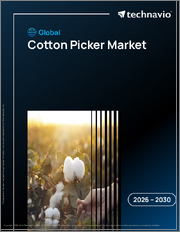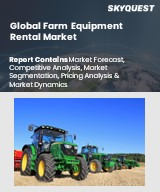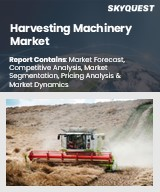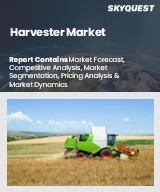
|
시장보고서
상품코드
1584560
사탕수수 수확기 시장 평가 : 제품 유형(통줄기, 초퍼), 출력 정격(200hp 미만, 200-400hp, 400hp 이상), 지역별 기회 및 예측(2017-2031년)Sugarcane Harvesters Market Assessment, By Product Type [Whole-stalk Harvesters, Chopper Harvesters], By Power Rating [Less than 200 hp, 200 to 400 hp, Above 400 hp], By Region, Opportunities and Forecast, 2017-2031F |
||||||
세계의 사탕수수 수확기 시장 규모는 2023년 19억 6,000만 달러에서 예측 기간 중 CAGR 7.60%로 추이하며, 2031년에는 35억 2,000만 달러로 성장할 것으로 예측됩니다.
농업기계화의 진전과 세계의 설탕 소비량 증가에 의해 세계의 사탕수수 수확량은 대폭 증가할 것으로 예상되고 있습니다. 그러나 많은 사탕수수 생산 지역에서는 노동력 부족으로 인해 자동화되고 효율적인 수확 시스템 개발이 필요합니다. 수확 기계화는 수확량 증가와 작업 비용 절감 등의 이점이 있으며, 대규모 농업을 위한 효과적인 대안이 될 수 있습니다.
기술이 발전함에 따라 더 효과적인 기계가 발명되었습니다. 이러한 기계는 GPS 추적, 유연한 절단 높이, 자동 제어 및 기타 기능을 갖추고 있으며 연료 소비를 줄입니다. 이 기계를 도입한 결과, 사탕수수의 빌릿 품질이 향상되어 농가의 매출이 증가하고 작업 후 밭에서 발생하는 폐기물이 감소하는 것을 확인할 수 있습니다.
이 시장은 성장 잠재력과 함께 높은 초기 투자 비용과 복잡한 기술 등 중소규모 농가의 생존에 제약이 될 수 있는 문제도 있습니다. 그럼에도 불구하고 설탕 수요 증가와 세계 지속가능성에 대한 우려로 인해 세계 사탕수수 수확기 시장은 예측 기간 중 안정적인 성장률을 나타낼 것으로 예상됩니다.
세계의 사탕수수 수확기 시장을 조사했으며, 시장의 정의와 개요, 시장 규모 추이·예측, 각종 구분·지역/주요 국가별 상세 분석, 산업 구조, 시장 성장에 대한 영향요인 분석, 사례 연구, 경쟁 구도, 주요 기업의 개요 등을 정리하여 전해드립니다.
목차
제1장 프로젝트 범위와 정의
제2장 조사 방법
제3장 개요
제4장 고객의 소리
- 인구통계
- 시장의 인식과 제품 정보
- 브랜드 인지도와 로열티
- 구입 결정시 고려되는 요소
- 구입 채널
- 구입 빈도
- 기존 또는 예정 사용자
제5장 세계의 사탕수수 수확기 시장 전망
- 시장 규모 분석·예측
- 시장 점유율 분석·예측
- 제품 유형별
- 출력 정격별
- 지역별
- 기업 점유율 분석
- 마켓 맵 분석
제6장 북미의 사탕수수 수확기 시장 전망
- 시장 규모 분석·예측
- 시장 점유율 분석·예측
- 국가별 시장 평가
- 미국
- 캐나다
- 멕시코
제7장 유럽의 사탕수수 수확기 시장 전망
- 독일
- 프랑스
- 이탈리아
- 영국
- 러시아
- 네덜란드
- 스페인
- 터키
- 폴란드
제8장 아시아태평양의 사탕수수 수확기 시장 전망
- 인도
- 중국
- 일본
- 호주
- 베트남
- 한국
- 인도네시아
- 필리핀
제9장 남미의 사탕수수 수확기 시장 전망
- 브라질
- 아르헨티나
제10장 중동 및 아프리카의 사탕수수 수확기 시장 전망
- 사우디아라비아
- UAE
- 남아프리카공화국
제11장 규제 상황
제12장 수급 분석
제13장 밸류체인 분석
제14장 Porter's Five Forces 분석
제15장 PESTLE 분석
제16장 거시경제 지표
제17장 가격 분석
제18장 이익률 분석
제19장 시장 역학
- 시장 성장 촉진요인
- 시장이 해결해야 할 과제
제20장 시장 동향·개발
제21장 사례 연구
제22장 경쟁 구도
- 시장 리더 상위 5사의 경쟁 매트릭스
- 기업 에코시스템 분석(스타트업 vs 중소기업 vs 대기업)
- TOP 5사의 SWOT 분석
- TOP 10사의 상황
- John Deere Group
- Tirth Agro Technology Private Limited
- CNH Industrial N.V.
- AGCO Corporation
- Yanmar Holdings Co., Ltd.
- Grupo Jacto
- Zoomlion Heavy Industry Science and Technology Co., Ltd.
- SDF S.p.A.
- Hanje Hydrotech
- Gessner Pty Ltd
제23장 전략적 제안
제24장 Market Xcel - Markets and Data 소개·면책사항
KSA 24.11.15Global sugarcane harvesters market is projected to witness a CAGR of 7.60% during the forecast period 2024-2031, growing from USD 1.96 billion in 2023 to USD 3.52 billion in 2031. The harvested volume of sugarcane around the world is expected to grow significantly owing to the increasing mechanization of agriculture and the worldwide rise in sugar consumption. However, in many sugarcane-growing regions, labor shortage exists, leading to the development of automated and efficient harvesting systems, which are necessary. Due to the advantages of mechanized harvesting, such as increased crop yields and lowered operational costs, it becomes an effective option for farming on a larger scale.
Leaping forward to implementing technological advancements, the invention of more effective machines takes place. These machines consume less fuel with features such as GPS tracking, flexible cutting heights, and automated controls. As a result of employing machines, reduced wastage can be witnessed on the fields after the operation, along with higher billet quality of sugarcane, increasing farmers' revenue.
Along with the growth potential, the market has its challenges, which include high initial investment costs and complex technologies that may limit the sustenance of most small and medium-scale farmers. Nevertheless, owing to the increasing demand for sugar and global sustainability concerns, the global sugarcane harvesters market is projected to register a steady growth rate over the forecast period.
In April 2022, Civemasa introduced its latest whole-stalk sugarcane harvester, CCI 1500, which is made to divide and chop sugarcane laterally. The tool comes in two models, the CCI 1500 EL, which includes an extender to distribute cane at a distance of 5.50 meters, and the CCI 1500 ST, which allows cane to be disseminated laterally at a distance of 2.50 meters. The hydraulically powered conveyor articulation system allows sugarcane to be harvested in limited spaces, such as roadside ditches, incline regions, and adjacent sections of roadways.
Rising Global Sugar Demand Influences Market Growth
One of the key advantageous factors fueling the growth of the sugarcane industry is the growing global sugar consumption, which further affects the sugarcane harvester market. Sugar remains one of the most consumed ingredients by the food and beverage sector, and its usage is on an upward trend, particularly in developing nations with growing populations that are leading to changing concurrently increasing sugar intake.
As per the International Sugar Organization, the global consumption of sugar increased in 2022 and reached 176.318 million tons, an increase of 7.045 million tons or 4.2% than the previous year. Moreover, there was a rise in the global volume of sugar traded as it reached a new peak of 69.822 million tons, an increase of 6.023 million tons compared to the year 2021. The overwhelming increase in exports by India (+4.028 million tons) and Thailand (+3.221 million tons) is at this core. However, no appreciable modification was observed in Brazil even though Brazil is the largest sugar-exporting country in the world.
Furthermore, sugarcane cultivation is not limited to sugar production, as bioethanol produced from sugarcane is widely used, increasing the demand for sugarcane. Hence, the increased consumption of sugar and other sugarcane products has made farmers and producers turn to more modern and efficient mechanized harvesting techniques.
Better Residue Management Catalyzes Market Expansion
Improved residue management is a key factor driving the growth of the global sugarcane harvesters market. Contemporary harvesters are designed with modern residue management systems that effectively deal with crop residues, lowering the need for manual working. These systems allow for the cutting, collection, and disposal of leaves and stalks of sugarcane with great precision, thereby reducing wastage and making it easier to prepare the fields for the next crop.
The efficient management of residues leads to enhanced soil health because properly treated crop remains can be utilized either in the form of mulching or biofuels, which adds value ecologically and commercially. It is consistent with the current trends in agriculture and assists farmers in following environmental laws. Also, it minimizes the occurrences of pests and diseases, which in turn increases the crop yield.
Further driving the market's growth, governments of all the major agricultural countries are providing subsidies and other incentives to promote the use of harvesters with efficient residue management systems. For instance, in December 2023, to help lower the quantity of PM2.5 dust in the 2022-2023 harvest year, the Thai government approved incentives worth USD 225 million (THB 8 billion) for sugarcane farmers who gave their consent to cut fresh sugarcane without burning the leftovers. As part of the program, farmers received USD 3.4 (THB 120) per ton from the government.
200 to 400 hp Power Rating Holds a Significant Market Share
The 200 to 400 horsepower power rating category commands a substantial portion of the global sugarcane harvesters market owing to its appropriateness for efficiency and performance. The sugarcane harvesters in this engine power segment are mainly used for extensive farming operations because they can effectively work on large sugarcane fields without using too much fuel or incurring high operational costs.
The performance of these machines in the field is remarkable and strikingly swift, even in cases of dense or overgrown sugarcane stalks to cause minimum possible damage. Due to their flexibility and ability to cope with different area sizes, they are preferred by many farmers who look for both efficiency and steadiness.
In addition, the range of 200 to 400 hp is considered optimal for medium and large-scale farms, as it balances the initial outlay and final returns. With sugarcane farming prone to much mechanization, this power segment is projected to continue leading in the global market.
In May 2024, Guangxi LiuGong Machinery Co., Ltd. launched its latest sugarcane harvester, S935TA, with the powerful 375 hp Cummins QSM11 engine. The launch offers low fuel consumption, a high production ratio, and simple maintenance.
Asia-Pacific to Dominate the Market Share
The largest share of the global sugarcane harvesters market has been accorded to Asia-Pacific due to high levels of sugarcane production in countries such as India, China, and Thailand. The region has a favorable climate and a large land area, which allows for substantial amounts of sugar to be produced globally. The rising need for mechanized farming systems due to lack of labor has also stimulated the uptake of sugarcane harvesters in the region.
A significant push by the governments of the region towards farm mechanization by providing various subsidies and incentives further enhances market growth. Furthermore, leading corporations have been putting in programs targeted at training agriculturalists for the use of sophisticated harvesting machines. These programs aid the farmers in the proper use of the new machinery, hence lowering the wastage of crops and increasing yield efficiency. For instance, in April 2023, one of the leaders in agricultural equipment and a CNH Industrial N.V. affiliate, Case IH, established Unnat Kaushal-Sugarcane Harvester Operator Training, its latest Corporate Social Responsibility program. For sugarcane harvester operators across India, the program was introduced in association with Krishi Vigyan Kendra (KVK) in Baramati, Maharashtra. Through training sugarcane farmers on how to use harvesting equipment optimally to increase overall productivity and maximize machine uptime, the project aimed at promoting sustainable sugarcane cultivation.
Future Market Scenario (2024 - 2031F)
In response to the rising environmental concerns, the harvesters will be made energy efficient and low emission compliant in line with the sustainability and global carbon reduction strategies.
Farmers will be able to automatically manage harvesting and crops, as future harvesters will be able to incorporate more data analytics, remote monitoring capabilities, and real-time performance tracking.
More companies will allocate resources and funds to training regimes to enable the farmers to utilize the modern equipment optimally, increasing productivity while reducing equipment-related
problems.
Key Players Landscape and Outlook
Key participants in the global sugarcane harvesters market concentrate on innovation and expanding the range of their products to satisfy farmers' ever-changing requirements. These entities are funneling monetary resources into research and development activities to improve the efficiency of the harvester by incorporating automation systems, global positioning systems (GPS), and fuel-efficient engines, among other advanced technologies. As the need for sustainability in the agricultural sector continues to increase, several producers are developing green machines with lesser emissions and consumed fuel.
The prospects for the market of sugarcane harvesters in the future seem to be bright, owing to the growing mechanization of farming and the increasing demand for sugar. Any firm that remains innovative and provides efficient and dependable machines to suit the ever-changing farming needs is expected to command a significant market share.
For instance, in May 2023, with the introduction of the Austoft sugarcane harvester, Case IH, a trademark of CNH Industrial N.V., achieved the production milestone of 1000 sugarcane harvesters. The Case IH Austoft series sugarcane harvesters aim to increase harvesting efficiency. Its capacity to harvest in various situations is increased by the lightweight, compact machine's ability to harvest in partially wet fields. The series is intended for sugarcane farms with row-to-row spacing of 1.2 meters or more, which many sugar mills have been using to automate their cane harvesting process.
Table of Contents
1. Project Scope and Definitions
2. Research Methodology
3. Executive Summary
4. Voice of Customer
- 4.1. Demographics (Income - Low, Mid and High; Geography; Nationality; etc.)
- 4.2. Market Awareness and Product Information
- 4.3. Brand Awareness and Loyalty
- 4.4. Factors Considered in Purchase Decision
- 4.4.1. Efficiency and Performance
- 4.4.2. Cost and Return on Investment
- 4.4.3. Technology and Features
- 4.4.4. Durability and Reliability
- 4.4.5. Fuel Efficiency
- 4.4.6. Environmental Impact
- 4.4.7. Brand Reputation
- 4.4.8. After-sales Service
- 4.4.9. Farm Size
- 4.5. Purchase Channel
- 4.6. Frequency of Purchase
- 4.7. Existing or Intended User
5. Global Sugarcane Harvesters Market Outlook, 2017-2031F
- 5.1. Market Size Analysis & Forecast
- 5.1.1. By Value
- 5.1.2. By Volume
- 5.2. Market Share Analysis & Forecast
- 5.2.1. By Product Type
- 5.2.1.1. Whole-stalk Harvesters
- 5.2.1.2. Chopper Harvesters
- 5.2.2. By Power Rating
- 5.2.2.1. Less than 200 hp
- 5.2.2.2. 200 to 400 hp
- 5.2.2.3. Above 400 hp
- 5.2.3. By Region
- 5.2.3.1. North America
- 5.2.3.2. Europe
- 5.2.3.3. Asia-Pacific
- 5.2.3.4. South America
- 5.2.3.5. Middle East and Africa
- 5.2.4. By Company Market Share Analysis (Top 5 Companies and Others - By Value, 2023)
- 5.2.1. By Product Type
- 5.3. Market Map Analysis, 2023
- 5.3.1. By Product Type
- 5.3.2. By Power Rating
- 5.3.3. By Region
6. North America Sugarcane Harvesters Market Outlook, 2017-2031F*
- 6.1. Market Size Analysis & Forecast
- 6.1.1. By Value
- 6.1.2. By Volume
- 6.2. Market Share Analysis & Forecast
- 6.2.1. By Product Type
- 6.2.1.1. Whole-stalk Harvesters
- 6.2.1.2. Chopper Harvesters
- 6.2.2. By Power Rating
- 6.2.2.1. Less than 200 hp
- 6.2.2.2. 200 to 400 hp
- 6.2.2.3. Above 400 hp
- 6.2.3. By Country Share
- 6.2.3.1. United States
- 6.2.3.2. Canada
- 6.2.3.3. Mexico
- 6.2.1. By Product Type
- 6.3. Country Market Assessment
- 6.3.1. United States Sugarcane Harvesters Market Outlook, 2017-2031F*
- 6.3.1.1. Market Size Analysis & Forecast
- 6.3.1.1.1. By Value
- 6.3.1.1.2. By Volume
- 6.3.1.2. Market Share Analysis & Forecast
- 6.3.1.2.1. By Product Type
- 6.3.1.2.1.1. Whole-stalk Harvesters
- 6.3.1.2.1.2. Chopper Harvesters
- 6.3.1.2.2. By Power Rating
- 6.3.1.2.2.1. Less than 200 hp
- 6.3.1.2.2.2. 200 to 400 hp
- 6.3.1.2.2.3. Above 400 hp
- 6.3.1.2.1. By Product Type
- 6.3.1.1. Market Size Analysis & Forecast
- 6.3.2. Canada
- 6.3.3. Mexico
- 6.3.1. United States Sugarcane Harvesters Market Outlook, 2017-2031F*
All segments will be provided for all regions and countries covered
7. Europe Sugarcane Harvesters Market Outlook, 2017-2031F
- 7.1. Germany
- 7.2. France
- 7.3. Italy
- 7.4. United Kingdom
- 7.5. Russia
- 7.6. Netherlands
- 7.7. Spain
- 7.8. Turkey
- 7.9. Poland
8. Asia-Pacific Sugarcane Harvesters Market Outlook, 2017-2031F
- 8.1. India
- 8.2. China
- 8.3. Japan
- 8.4. Australia
- 8.5. Vietnam
- 8.6. South Korea
- 8.7. Indonesia
- 8.8. Philippines
9. South America Sugarcane Harvesters Market Outlook, 2017-2031F
- 9.1. Brazil
- 9.2. Argentina
10. Middle East and Africa Sugarcane Harvesters Market Outlook, 2017-2031F
- 10.1. Saudi Arabia
- 10.2. UAE
- 10.3. South Africa
11. Regulatory Landscape
12. Demand Supply Analysis
13. Value Chain Analysis
14. Porter's Five Forces Analysis
15. PESTLE Analysis
16. Macro-economic Indicators
17. Pricing Analysis
18. Profit Margin Analysis
19. Market Dynamics
- 19.1. Market Drivers
- 19.2. Market Challenges
20. Market Trends and Developments
21. Case Studies
22. Competitive Landscape
- 22.1. Competition Matrix of Top 5 Market Leaders
- 22.2. Company Ecosystem Analysis (Startup v/s SME v/s Large-scale)
- 22.3. SWOT Analysis for Top 5 Players
- 22.4. Key Players Landscape for Top 10 Market Players
- 22.4.1. John Deere Group
- 22.4.1.1. Company Details
- 22.4.1.2. Key Management Personnel
- 22.4.1.3. Products and Services
- 22.4.1.4. Financials (As Reported)
- 22.4.1.5. Key Market Focus and Geographical Presence
- 22.4.1.6. Recent Developments/Collaborations/Partnerships/Mergers and Acquisition
- 22.4.2. Tirth Agro Technology Private Limited
- 22.4.3. CNH Industrial N.V.
- 22.4.4. AGCO Corporation
- 22.4.5. Yanmar Holdings Co., Ltd.
- 22.4.6. Grupo Jacto
- 22.4.7. Zoomlion Heavy Industry Science and Technology Co., Ltd.
- 22.4.8. SDF S.p.A.
- 22.4.9. Hanje Hydrotech
- 22.4.10. Gessner Pty Ltd
- 22.4.1. John Deere Group
Companies mentioned above DO NOT hold any order as per market share and can be changed as per information available during research work.



















